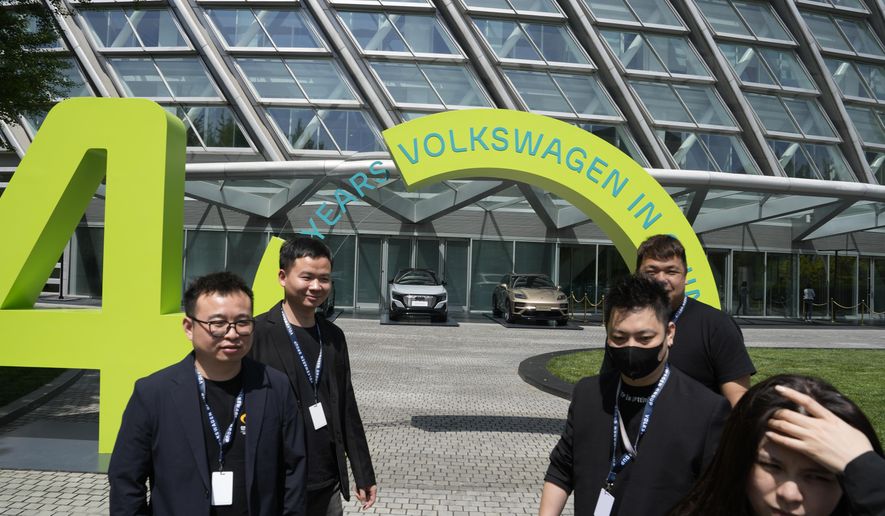BEIJING — As auto giant Volkswagen AG races to catch up with upstart Chinese competitors, it has drivers like 26-year-old Ren Yiling in mind.
She is young and wants to play video games in her car. The digital features of her Zeekr 001, a European-designed electric car from China’s Geely Holding Group, appeal to her. She uses her smartphone to help her parents adjust their seats and tells an animated voice assistant to open the window or play music.
“I once sung karaoke in the car when travelling a long way with my family,” she said. “To me, the car is more like an entertainment place. I am a singer.”
Foreign automakers have been caught flat-footed in China by an electric vehicle boom that has shaken up the market, the world’s largest, over the last three years. Taking a page from Tesla, China’s automakers and hundreds of start-ups have developed EVs loaded with tablet-like screens, AI-enabled information and entertainment options and autonomous driving capabilities.
EV sales in China, encouraged by green energy subsidies and tax breaks, jumped from 900,000 units in 2020 to 5.1 million last year, accounting for 24% of new car sales, according to the China Passenger Car Association, an industry group. The boom caters to a new breed of car buyers who equate an EV with digital connectivity and are demanding smartphone features in their vehicles.
That has left makers like Volkswagen, which sells about one-third of its cars in China, scrambling to develop new models for a very different market than back home, and expanding far beyond its roots in China as a maker of no-frills sedans used by taxi fleets.
PHOTOS: Volkswagen revamps its approach in China in bid to overtake upstart EV makers
The Volkswagen Group, which also includes Audi and Porsche, plans to launch 40 new models in China over the next three years and to have a lineup of 30 EVs by 2030 in what Volkswagen CEO Oliver Blume told investors Wednesday is the company’s “second home market.”
Japanese maker Nissan has also stepped up, saying it would develop four new-energy models, which can include hybrids, for the Chinese market by 2026.
Ralf Brandstätter, VW’s CEO in China, said drivers use their cars differently in China, where the average age of an EV buyer is 35 years old, versus 55 in Europe.
“It’s not only to go from A to B, they live in their car as additional living space. They spend time there with friends. They spend time there with families,” he told journalists ahead of the opening of the Beijing Auto Show on Thursday. “And they are … highly tech-savvy. (They are) using their mobiles five hours per day and they want to have the same digital connectivity with their cars. So we will deliver these Chinese ‘wow’ effects that Chinese customers expect.”
The battle is not only about digital gadgetry. Chinese EV makers have driven down battery and production costs and flooded the market with choices, depressing prices to levels that are likely unsustainable. China’s largest EV maker, BYD, has dropped the price of its Seagull model below $10,000 at home, about half of what it sells for in Mexico and Brazil.
“The Chinese market remains very difficult, especially when it comes to electric vehicles” Brandstätter said, noting that EV prices in China had fallen 30% in the past year even before a new round of price cuts started this month.
Volkswagen’s response has been to shift to developing cars in China from the ground up, rather than adapting European models to the local market. The company announced earlier this month that it would invest 2.5 billion euros ($2.7 billion) to expand research and development and production in the city of Hefei, where it has teamed up with Chinese EV maker XPENG Motors to develop two midsize VW models to launch in 2026.
The company is developing a new EV platform, which includes the chassis and battery packs, just for China to try to bring down costs by 40%. That would enable VW to be profitable at current market prices, Brandstätter said, calling China an essential market for Volkswagen.
“I think they are really putting their foot down and saying we need to do more, we need to speed up,” said Beatrix Keim, the China director at CAR, an automotive research center in Germany.
Volkswagen still has a ways to go. It sold only 41,000 EVs in China in the first three months of the year, though that was up 91% over the previous year and followed the rollout of new or updated models. “I think they really learned already their lesson – that they need to be faster,” Keim said.
The company has come under fire for operating a plant in the China’s western Xinjiang region, where Western governments have accused the Chinese government of human rights violations. Volkswagen has said an audit it commissioned found no evidence of forced labor at the facility, though Brandstätter said Wednesday that VW is in talks with its Chinese joint venture partner in Xinjiang and is investigating options for the plant’s future.
The company showed off its digital development efforts to journalists at an R&D facility in Beijing earlier this week. Drivers can pick avatars for an on-screen assistant that responds to voice requests for directions or to adjust the inside temperature. A 3-D avatar to be launched this year has changeable outfits and can rock with the music.
Such features are also being added to VW’s gasoline-powered vehicles, said Matthias Glodny, the vice president for products in China. “We think we have a plan,” he said, “and now we have to deliver.”
___
Associated Press researcher Yu Bing contributed.




Please read our comment policy before commenting.